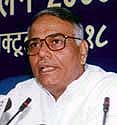Sinha kicks off second-generation reforms
By Nachiketa Desai | 28 Feb 2002
 The fiscal deficit for 2002-03 has been pegged at 5.3 per cent of the GDP. Sinha has proposed to mobilise Rs 10,500 crore additional revenue, of which Rs 6,000 crore is to come from direct taxes and Rs 4,500 crore from indirect taxes.
The fiscal deficit for 2002-03 has been pegged at 5.3 per cent of the GDP. Sinha has proposed to mobilise Rs 10,500 crore additional revenue, of which Rs 6,000 crore is to come from direct taxes and Rs 4,500 crore from indirect taxes.There has been no change announced in personal income tax rates, though a 5-per cent national security surcharge has been levied. The 2-per cent Gujarat surcharge levied on income tax last year has however been abolished.
By removing the cap on investment by foreign financial institutions in most sectors, Sinha hopes to attract investments in all key sectors, including infrastructure, banking and industry.
By encouraging private participation in the development of key infrastructure, such as housing, roads, power, ports and airports, increasing public investment in rural infrastructure and agriculture, and dismantling the price-control mechanism for petroleum products, Sinha hopes to trigger off what he describes as "second-generation economic reforms."
Explaining the broad strategy of the budget for 2002-03, Sinha said he proposed to consolidate and implement the second-generation reforms by following the strategy of reform-linked public funding, whereby the states will be encouraged to implement the reforms.
He said already the government has started the process of deregulation of controls in the agriculture, pharmaceutical, telecommunications and petroleum sectors. He said providing a boost to agriculture and agro-industries will continue to remain the prime concern of the government. But, he said, in order to usher in a "third agrarian revolution," major policy changes are required, besides a renewed thrust on diversification and food processing.
Emphasising the need to improve the rural infrastructure, Sinha announced to raise the funding of the Rural Infrastructure Development Fund from Rs 5,000 crore to Rs 5,500 crore next year, and a reduction in the interest rate from 10.5 per cent to 8.5 per cent. But, he said, assistance to the states from the RIDF will be linked to reforms in the agriculture and rural sectors.
He proposed to set up a new corporation for agriculture insurance by the existing public sector general insurance companies to extend the coverage of crop insurance.
Sinha also proposed to set up an urban reform incentive fund, with an initial allocation of Rs 500 crore to provide reform-linked assistance to states. The fund will seek to provide incentive reforms in rent control laws and repeal of urban land ceiling acts, rationalisation of high stamp duty regimes, revision of byelaws to streamline the approvals process for construction of buildings and development of sites.
To provide a further incentive for urban local bodies to become credit-worthy and to invest in urban infrastructure, Sinha proposed to allow the issue of municipal tax-free bonds up to Rs 500 crore in 2002-03, up from Rs 200 crore this year.
He said public investment in key infrastructure sectors will be stepped up. The plan outlay inclusive of internal and extra budgetary resources in power, roads and national highways and railways is being increased by 22 per cent, 39 per cent and 23 per cent respectively, to a total of Rs 37,919 crore



















